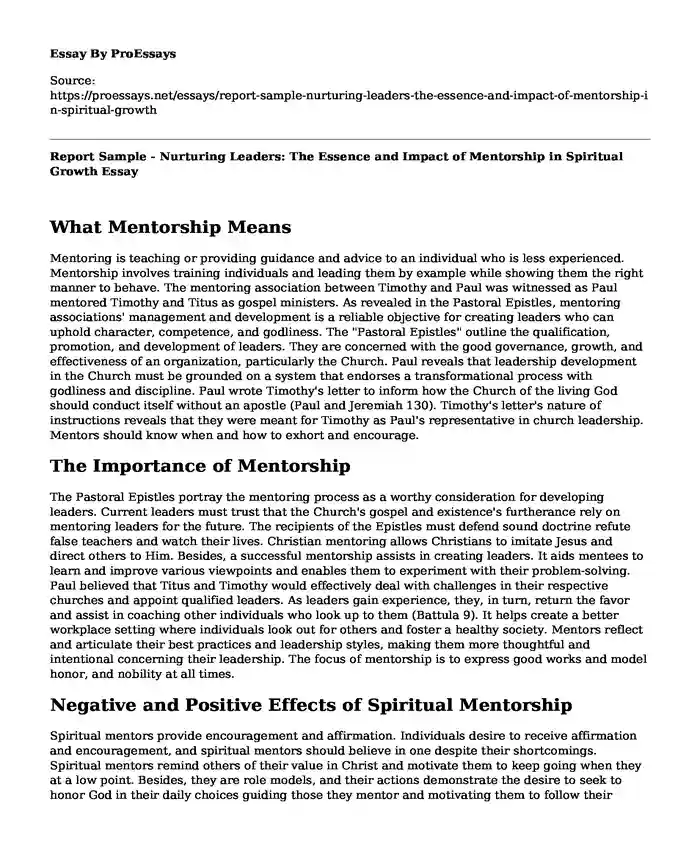What Mentorship Means
Mentoring is teaching or providing guidance and advice to an individual who is less experienced. Mentorship involves training individuals and leading them by example while showing them the right manner to behave. The mentoring association between Timothy and Paul was witnessed as Paul mentored Timothy and Titus as gospel ministers. As revealed in the Pastoral Epistles, mentoring associations' management and development is a reliable objective for creating leaders who can uphold character, competence, and godliness. The "Pastoral Epistles" outline the qualification, promotion, and development of leaders. They are concerned with the good governance, growth, and effectiveness of an organization, particularly the Church. Paul reveals that leadership development in the Church must be grounded on a system that endorses a transformational process with godliness and discipline. Paul wrote Timothy's letter to inform how the Church of the living God should conduct itself without an apostle (Paul and Jeremiah 130). Timothy's letter's nature of instructions reveals that they were meant for Timothy as Paul's representative in church leadership. Mentors should know when and how to exhort and encourage.
The Importance of Mentorship
The Pastoral Epistles portray the mentoring process as a worthy consideration for developing leaders. Current leaders must trust that the Church's gospel and existence's furtherance rely on mentoring leaders for the future. The recipients of the Epistles must defend sound doctrine refute false teachers and watch their lives. Christian mentoring allows Christians to imitate Jesus and direct others to Him. Besides, a successful mentorship assists in creating leaders. It aids mentees to learn and improve various viewpoints and enables them to experiment with their problem-solving. Paul believed that Titus and Timothy would effectively deal with challenges in their respective churches and appoint qualified leaders. As leaders gain experience, they, in turn, return the favor and assist in coaching other individuals who look up to them (Battula 9). It helps create a better workplace setting where individuals look out for others and foster a healthy society. Mentors reflect and articulate their best practices and leadership styles, making them more thoughtful and intentional concerning their leadership. The focus of mentorship is to express good works and model honor, and nobility at all times.
Negative and Positive Effects of Spiritual Mentorship
Spiritual mentors provide encouragement and affirmation. Individuals desire to receive affirmation and encouragement, and spiritual mentors should believe in one despite their shortcomings. Spiritual mentors remind others of their value in Christ and motivate them to keep going when they at a low point. Besides, they are role models, and their actions demonstrate the desire to seek to honor God in their daily choices guiding those they mentor and motivating them to follow their steps. Spiritual mentors also provide wise counsel during tough decisions in life and guide their mentees in the right direction as they steer them away from previously made mistakes. They prepare individuals for what is to come as they advise a Christian viewpoint. Paul was aware of Timothy's timidity and weakness and encouraged him to fulfill his calling to stand for the truth. Moreover, they recognize that the most significant thing in an individual's life is developing a personal relationship with God and encouraging mentees to invest in that association. One can grow spiritually and mature in their faith. However, false teachings and adverse effects may exist from incompetent leaders who lack integrity and possess a godliness form but lack real power. Some mentors may fail to demonstrate transparent reliance on God and flesh out personal faith through the ministry's trials. The pressure on competence and character may influence false teachers.
Works Cited
Battula, Manasa. "Why Mentoring Matters." 15 Oct. 2018, medium.com/joinwest/why-mentoring-matters-ec54cfdb828b#:~:text=Develops%20Leaders%3A%20A%20successful%20mentorship,who%20looks%20up%20to%20them.
Paul, Kolawole Oladotun, and Adelodun Jeremiah. "The Concept of Leadership in Pastoral Epistles: A Critical Examination."
Cite this page
Report Sample - Nurturing Leaders: The Essence and Impact of Mentorship in Spiritual Growth. (2024, Jan 10). Retrieved from https://proessays.net/essays/report-sample-nurturing-leaders-the-essence-and-impact-of-mentorship-in-spiritual-growth
If you are the original author of this essay and no longer wish to have it published on the ProEssays website, please click below to request its removal:
- Organizational Behavior Questions and Answers
- People and Task-Centered Recommendations for Minimizing Resistance to Change
- Diversification Into Luxury Goods Paper Example
- Leadership, Procedural Justice & Unit-Level OCB: Essay Sample
- MBA & Leadership: A Case Study of My Career in Trinidad & Tobago
- Essay Example on Project Management Model: Boost Preparedness, Reduce Cost and Risk
- Paper Example on Understanding Lessons Learned in Project Management: Impact on Future Outcomes







